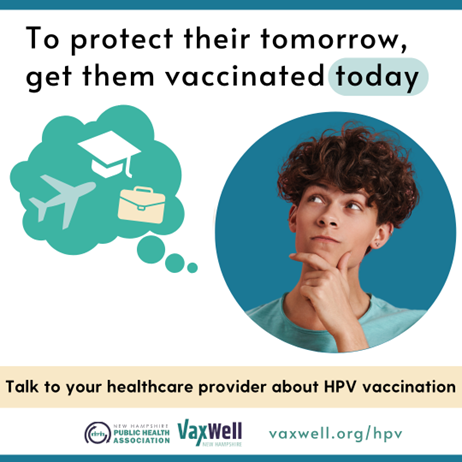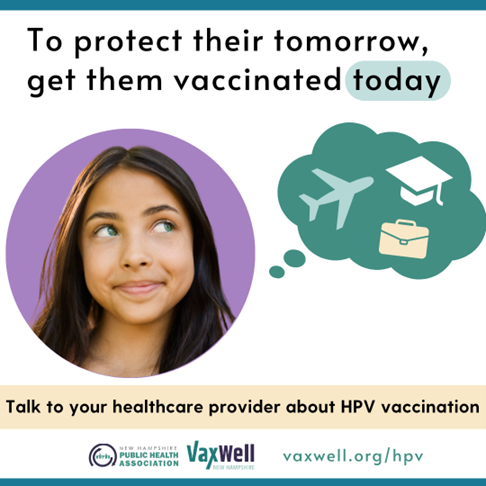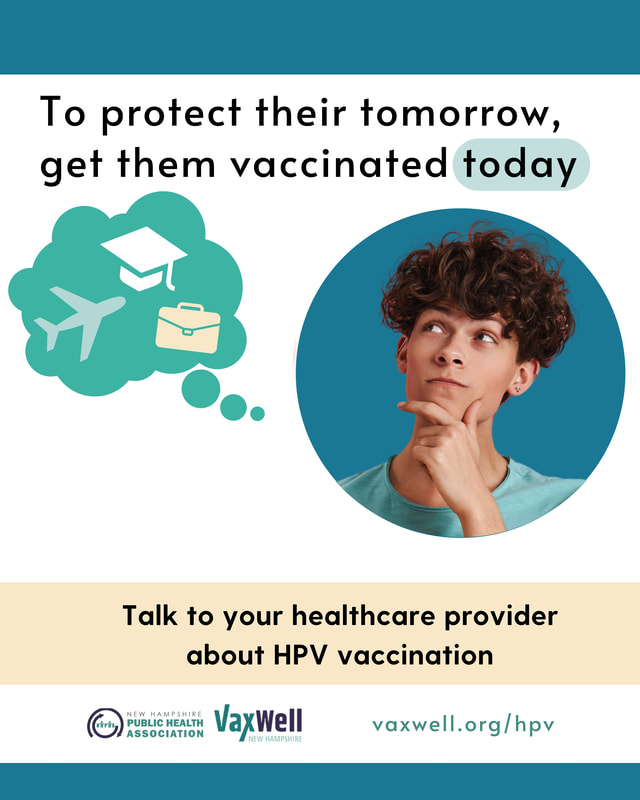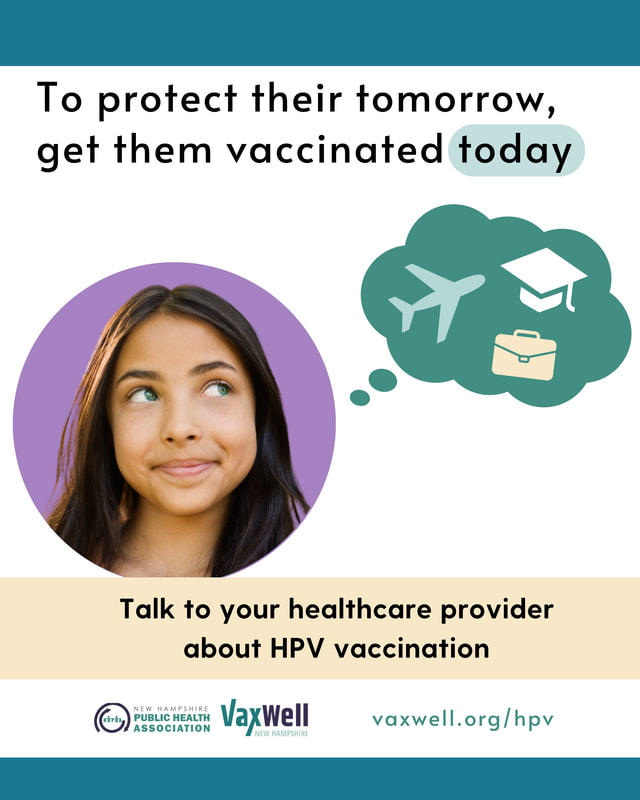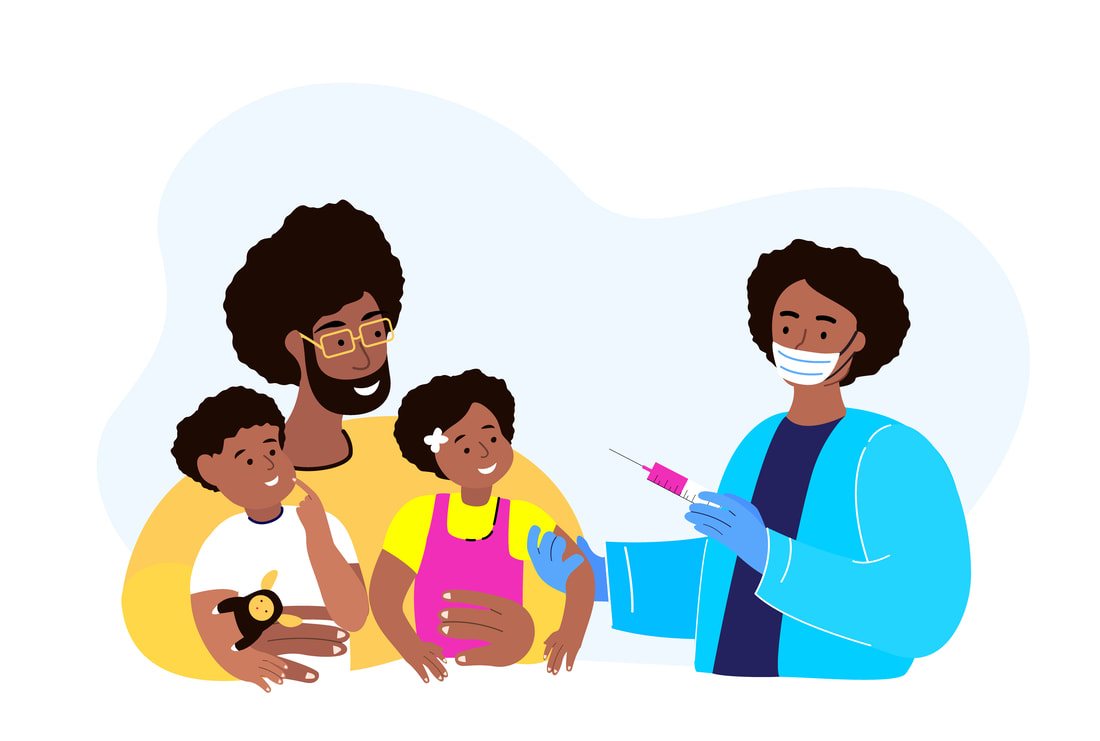HPV Disease
Talking Points: Children and Adolescents
|
Social Media Messages: Children and Adolescents
|
Facebook/Instagram/LinkedIn
|
X (Twitter)
| ||||||||||||
|
|
|
| ||||||||||||||||||||||||
HPV Campaign Posters: Children and Adolescents
Request posters and NHPHA will deliver it to you.
HPV Vaccine
Talking Points: Children and Adolescents
|
Addressing Common Misconceptions
- HPV vaccine is not just for girls; boys need it also. HPV disease can affect boys and men, also leading to cancer of the penis, anus and back of the throat.
- The HPV vaccine cannot give you HPV, nor can it give you cancer. The vaccine is made from one piece of the virus that has been killed, so there is no way that it can cause HPV infection or lead to cancer cells in your child’s body.
- Some parents have concerns that vaccination will encourage sexual behavior and, therefore, choose not to vaccinate. Studies have shown that HPV vaccination is not associated with increased sexual activity and reinforces the benefits of early vaccination.
- The HPV vaccine will not cause your child/teen to have problems having children later in life. However, HPV vaccine protects fertility by preventing HPV infections that can cause fertility issues. For example, people who develop HPV cancer or precancer may need treatments such as chemotherapy or radiation. These treatments can affect their ability to have children later in life.
Background Information: Children and Adolescents
- Research shows that parents trust their child’s healthcare provider the most as a trusted source for the HPV vaccine. The CDC and AAP encourage healthcare professionals to recommend HPV vaccination in the same way and on the same day that they recommend other vaccines for adolescents.
- Excerpts from the CDC’s Advisory Committee on Immunization Practices (ACIP) recommendations are summarized below. Detailed recommendations may be found at https://www.cdc.gov/vaccines/vpd/hpv/hcp/recommendations.html.
- HPV vaccine is routinely recommended for girls and boys at 11 or 12 years old. Vaccination can be started at 9 years old.
- ACIP also recommends HPV vaccination for everyone through age 26 if they were not adequately vaccinated when younger. HPV vaccination is given as a series of two or three doses, depending on age at initial vaccination. (See dosing schedule below).
- Vaccination can be started at 9 years old. The National HPV Vaccination Roundtable has compiled new evidence, recently published, on the impact of initiating HPV vaccination at ages 9-10, including population studies, quality improvement projects, brief reports, and commentaries from experts in the field. The collection of published articles shows the benefits, effectiveness, and acceptability of routinely recommending HPV vaccination for all preteens starting at age nine.
Dosing Schedules for HPV Vaccination
Two doses of the HPV vaccine are recommended for most persons who start the vaccine series before their 15th birthday.
Three doses of HPV vaccine are recommended for teens and young adults who start the series at ages 15 through 26 years and for immunocompromised persons.
- The second dose of the HPV vaccine should be given 6 to 12 months after the first dose.
- Adolescents who receive two doses less than 5 months apart will require a third dose of the HPV vaccine.
Three doses of HPV vaccine are recommended for teens and young adults who start the series at ages 15 through 26 years and for immunocompromised persons.
- The recommended three-dose schedule is 0, 1–2 and 6 months.
- Three doses are recommended for immunocompromised persons (including those with HIV infection) aged 9 through 26 years.
Source: https://www.cdc.gov/vaccines/vpd/hpv/hcp/recommendations.html and https://www.cdc.gov/vaccines/schedules/
Contraindications and Precautions
A severe allergic reaction (e.g., anaphylaxis) to a vaccine component or following a prior dose of the HPV vaccine is a contraindication to receipt of the HPV vaccine.
HPV vaccine is not recommended during pregnancy. Pregnant people should delay starting the vaccination series until after the pregnancy. However, pregnancy testing before vaccination is not needed. Although HPV vaccines have not been linked to causing adverse pregnancy outcomes or side effects (adverse events) to the developing fetus among pregnant people vaccinated inadvertently, HPV vaccines have not been studied in pregnant people in clinical trials.
- 9-valent HPV vaccine is produced in Saccharomyces cerevisiae (baker’s yeast) and is contraindicated for persons with a history of immediate hypersensitivity to yeast.
- A moderate or severe acute illness is a precaution to vaccination, and vaccination should be deferred until symptoms of the acute illness improve.
- A minor acute illness (e.g., diarrhea or mild upper respiratory tract infection, with or without fever) is not a reason to defer vaccination.
HPV vaccine is not recommended during pregnancy. Pregnant people should delay starting the vaccination series until after the pregnancy. However, pregnancy testing before vaccination is not needed. Although HPV vaccines have not been linked to causing adverse pregnancy outcomes or side effects (adverse events) to the developing fetus among pregnant people vaccinated inadvertently, HPV vaccines have not been studied in pregnant people in clinical trials.
- If a person is found to be pregnant after starting the HPV vaccine series, second and/or third doses should be delayed until they are no longer pregnant.
- If a person receives the HPV vaccine and later learns that they are pregnant, there is no reason to be alarmed.
- Anyone who learns they are pregnant when they receive an HPV vaccine can contact the manufacturer at 1-877-888-4231.
- Any suspected adverse events following HPV vaccination during pregnancy should be reported to VAERS.
Vaccine Efficacy
Studies in the United States and other countries have shown that HPV vaccination is already preventing cancer-causing infections, anogenital warts, and cervical precancers. Some data from other countries have found early evidence of vaccine effectiveness against cervical cancer.
To find out if the HPV vaccine is affecting cervical cancer rates in the United States, CDC scientists looked at data from United States Cancer Statistics from 1999 to 2017. The statistics provide information on new cancer cases and cancer deaths for nearly 98% of the United States population. They focused on girls and women in three age groups: 15 to 20, 21 to 24, and 25 to 29.
From 1999 to 2017, about 13,000 cervical cancers were found among girls and women who were 15 to 29 years old. That’s about 700 cancers per year in this age group. The total number of cervical cancer cases dropped for all age groups from 1999 to 2017.
Data from clinical trials and ongoing research show that HPV vaccination provides long-lasting protection.
For more information on vaccine effectiveness and duration of protection, visit HPV Vaccine Safety and Effectiveness Data | CDC.
To find out if the HPV vaccine is affecting cervical cancer rates in the United States, CDC scientists looked at data from United States Cancer Statistics from 1999 to 2017. The statistics provide information on new cancer cases and cancer deaths for nearly 98% of the United States population. They focused on girls and women in three age groups: 15 to 20, 21 to 24, and 25 to 29.
From 1999 to 2017, about 13,000 cervical cancers were found among girls and women who were 15 to 29 years old. That’s about 700 cancers per year in this age group. The total number of cervical cancer cases dropped for all age groups from 1999 to 2017.
- In girls and women who were 15 to 20 years old, the number of cervical cancers dropped from 79 during 1999 to 2000 to 32 during 2015 to 2017.
- In women who were 21 to 24 years old, cervical cancers dropped from 151 in 1999 to 69 in 2017.
- In women who were 25 to 29 years old, cervical cancers dropped from 685 in 1999 to 492 in 2017.
Data from clinical trials and ongoing research show that HPV vaccination provides long-lasting protection.
- Protection by HPV vaccination lasts for more than 10 years without becoming less effective.
- Studies are ongoing to evaluate the duration of protection further.
- No data indicate that the protection from HPV vaccination lessens over time.
For more information on vaccine effectiveness and duration of protection, visit HPV Vaccine Safety and Effectiveness Data | CDC.
Vaccine Safety
HPV vaccines are very safe. Scientific research shows the benefits of HPV vaccination far outweigh the potential risks. Like all medical interventions, vaccines can have some side effects. All vaccines used in the United States, including HPV vaccines, undergo extensive safety testing before the U.S. Food and Drug Administration (FDA) licenses them. During clinical trials before the licensure, the 9-valent HPV vaccine Gardasil 9 was studied in more than 15,000 males and females and was found to be safe and effective. For more information about HPV vaccine safety, visit HPV Vaccine Safety and Effectiveness Data | CDC.
Adverse Reactions
- The most common adverse reactions reported during clinical trials of HPV vaccines were local reactions at the site of injection.
- In prelicensure clinical trials, local reactions such as pain, redness, or swelling were reported by 20% to 90% of recipients.
- A temperature of 100°F during the 15 days after vaccination was reported in 10% to 13% of HPV vaccine recipients. A similar proportion of placebo recipients reported an elevated temperature.
- A variety of systemic adverse reactions have been reported by vaccine recipients, including nausea, dizziness, myalgia, and malaise. However, these symptoms occurred with equal frequency among both HPV vaccine and placebo recipients.
- Local reactions generally increased in frequency with increasing doses. However, reports of fever did not increase significantly with increasing doses.
- No serious adverse events have been associated with any HPV vaccine. CDC and the Food and Drug Administration conduct ongoing monitoring.
Syncope (fainting) can occur after any medical procedure, including vaccination. Adolescents should sit or lie down during vaccination and remain in that position for 15 minutes after vaccination. This is to prevent any injuries from a fall during a syncopal event.
Detailed HPV vaccine recommendations from the Advisory Committee on Immunization Practices (ACIP) may be found at: https://www.cdc.gov/vaccines/hcp/acip-recs/vacc-specific/hpv.html.
Tools for Healthcare Providers to Talk to Patients about HPV and the HPV Vaccine
- Tip sheet for talking to parents: https://www.cdc.gov/hpv/hcp/for-hcp-tipsheet-hpv.pdf
- Tip sheet for vaccination success: www.cdc.gov/hpv/downloads/Top10-improving-practice.pdf
- Practical and proven strategies: https://www.cdc.gov/hpv/hcp/boosting-vacc-rates.html
- Answering parent’s questions about HPV/HPV vaccine: https://www.cdc.gov/hpv/hcp/answering-questions.html
- Videos on “How I recommend the HPV Vaccine”: https://www.youtube.com/playlist?list=PLvrp9iOILTQaiV3HNjhyc6iKmn0j3R42k
Resources to Share with Parents and Patients
CDC handouts and materials: https://www.cdc.gov/hpv/hcp/educational-materials.html#parents
HPV Resources
CDC: Reasons to get HPV Vaccine
CDC: HPV Vaccine information for parents
CDC: Cancers caused by HPV are preventable
HPV Roundtable: Start HPV Vaccination at age nine
ACOG: HPV Infection and Vaccination
CDC: The Pink Book, HPV Chapter
CDC: HPV Vaccine Safety and Effectiveness Data
CDC: HPV information for healthcare professionals
CDC: Genital HPV infection
CDC: HPV Vaccine information for parents
CDC: Cancers caused by HPV are preventable
HPV Roundtable: Start HPV Vaccination at age nine
ACOG: HPV Infection and Vaccination
CDC: The Pink Book, HPV Chapter
CDC: HPV Vaccine Safety and Effectiveness Data
CDC: HPV information for healthcare professionals
CDC: Genital HPV infection
|
VAXWELL NH COALITION
NEW HAMPSHIRE PUBLIC HEALTH ASSOCIATION (NHPHA) 4 Park Street, Ste 201 Concord, NH 03301 United States Email: info@nhpha.org |
(c) 2024 NHPHA. All Rights Reserved.


